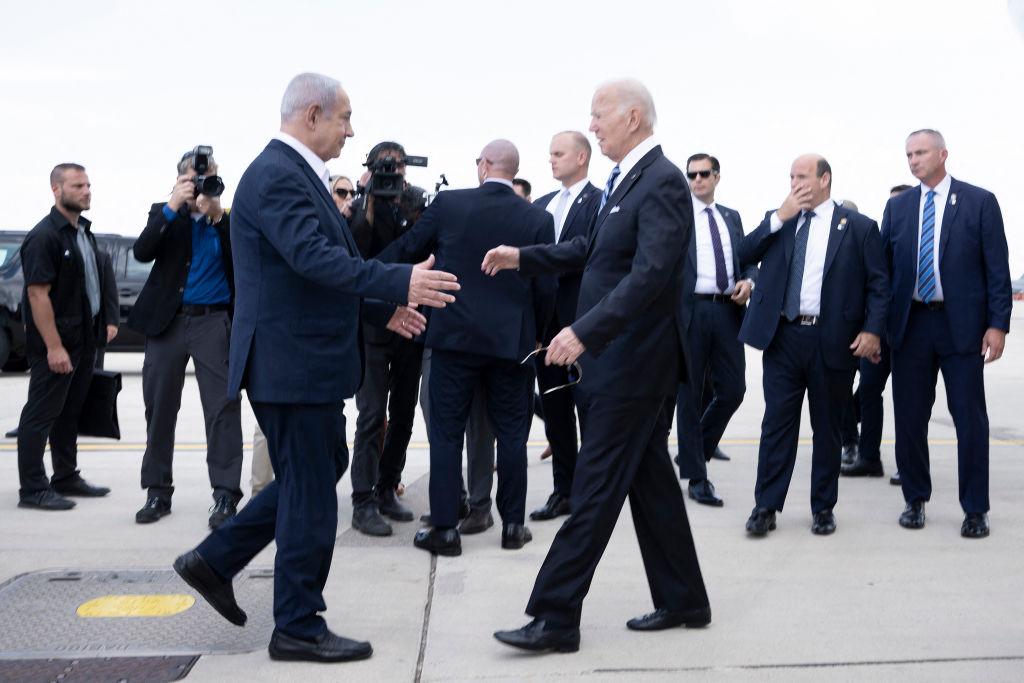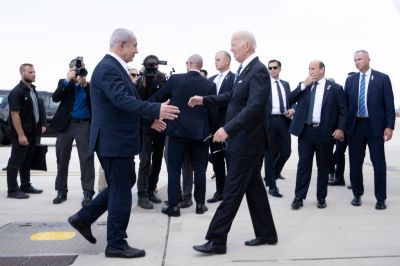TEL AVIV, Israel—Five months ago, U.S. President Joe Biden and Israeli Prime Minister Benjamin Netanyahu stood shoulder to shoulder here against the terrorist group responsible for the deadliest attack on Jews since the Holocaust. Now, with Israel’s operation to destroy Hamas’ military and governing capabilities in Gaza well underway, the world leaders have diverged on what would be the campaign’s final stage: a ground offensive in Rafah.
The Gaza Strip’s southernmost city, which shares a border with Egypt, currently hosts an estimated 1.5 million people. Among the sheltering masses are thousands of Hamas fighters who make up four of the group’s five remaining battalions, Israeli officials say. While the Biden administration publicly opposes a ground attack on Rafah, fearing widespread civilian casualties, Israel’s emergency government argues that leaving Hamas’ remaining fighting force intact would be tantamount to surrender.
The conflict’s uncertain path forward, together with public spats between Biden and Netanyahu, is now sparking concern that U.S. support for Israel’s war effort may be nearing a breaking point.
“From the beginning, we agreed that we must eliminate Hamas. But during the war, it is no secret, we had disagreements on the best manner to achieve this goal,” Netanyahu said of Biden Wednesday, following his first phone call with the American president in more than a month. “In our most recent conversation, I told him: We can not complete the victory without the IDF entering Rafah, to eliminate the remaining Hamas battalions. That is what we will do now as well.”
Netanyahu’s strong public stance comes amid behind-the-scenes efforts by U.S. and Israeli officials to avoid a falling out over the war’s prosecution.
Those efforts became more complicated following Democratic Senate Majority Leader Chuck Schumer’s recent speech on the Senate floor calling on Israel to hold new elections and declaring the country’s leadership no longer representative of its people. The prime minister “has lost his way by allowing his political survival to take precedence over the best interests of Israel,” Schumer said. “Israel cannot survive if it becomes a pariah.” Biden later noted that the majority leader had delivered a “good speech.”
But Biden and Netanyahu may be trying to smooth out their differences privately. During his conversation with the president this week, the Israeli prime minister agreed to send a delegation to Washington in the coming days to discuss alternatives to an offensive in Rafah. U.S. officials, for example, have proposed small-scale raids in the city as a way to target Hamas’ leadership while avoiding excessive civilian casualties. The U.S. hopes the more targeted approach would avoid exacerbating an increasingly desperate humanitarian situation in Rafah, where more than a million Gazans from elsewhere in the Strip have sought shelter.
“This isn’t just us saying, ‘No you can’t do it,” a U.S. official told Times of Israel in a report published Tuesday. “We’re saying that we’re willing to work with you on viable alternatives that still help you achieve your objectives.”
Yet to Israel, the alternatives seem unlikely to succeed in fully dismantling what Netanyahu has called “Hamas’ last stronghold.” With a large portion of the militant group’s organized fighting force still standing in Rafah, Israeli officials fear the surviving, albeit severely weakened, remnants of Hamas could emerge from the conflict to claim victory. They argue this prospect jeopardizes the postwar plan American negotiators so desperately want by posing a direct risk to any potential governing entities that could be alternatives to Hamas in Gaza.
“At the end of the day, if there are 15,000 terrorists in the Gaza Strip, you’re not going to have something else emerge,” Israeli Strategic Affairs Minister Ron Dermer, who is leading the delegation to Washington, said on Dan Senor’s “Call Me Back” podcast Thursday. “Nobody is going to step forward until they know that Hamas in Gaza is finished.”
Israel further hopes to establish control over the Philadelphi Corridor—an 8.7-mile-long stretch of land between Gaza and Egypt—through a ground incursion in the southernmost part of the Strip. The buffer zone was established when Israel returned the Sinai Peninsula to Egypt following the 1979 peace accords, but it has long served as a route for the above- and below-ground smuggling of weapons into Gaza. Netanyahu insists that some degree of Israeli control over the route, which includes the Rafah border crossing, is necessary for the full demilitarization of Gaza.
“You cannot say you support Israel’s goal of destroying Hamas and then oppose Israel when it takes the actions necessary to achieve that goal,” Netanyahu said last week, in remarks directed at the White House.
But the U.S., despite backing Israel’s war aim early on, may be faltering on whether the defeat of Hamas is an attainable objective. Administration officials have mentioned ridding the Gaza Strip of the group’s military and governing capabilities less frequently in recent public statements, focusing instead on securing the release of Israeli hostages. Moreover, last month’s Annual Threat Assessment by the director of national intelligence concluded that Israel will likely “face lingering armed resistance from Hamas for years to come.”
The same report also devoted a section to doubts about Netanyahu’s “viability” as the leader of Israel. “Distrust of Netanyahu’s ability to rule has deepened and broadened across the public from its already high levels before the war, and we expect large protests demanding his resignation and new elections,” the report found. “A different, more moderate government is a possibility.”
There’s now growing concern in Israel that the shifting American attitude could have a material impact on the war effort. Congressional Democrats have argued against the future of continued weapons sales to Israel should it move forward with the ground operation in Rafah. For the administration’s part, meanwhile, “There’s been no specific threats about cutting down or slowing down arms shipments,” Lazar Berman, a Jerusalem-based analyst and diplomatic correspondent at the Times of Israel, said in an interview with The Dispatch. “But they’re getting across the implicit threat that could happen if Israel doesn’t listen. So that would mean a change in policy, and that would mean a drastic one.”
The veiled threats over Rafah and scathing public criticism by administration officials and Democrats have not been well received in Jerusalem. War Cabinet minister Benny Gantz, one of Netanyahu’s foremost political rivals, said Schumer “erred in his remarks” about Israel’s elected leadership. “Israel is a robust democracy, and only its citizens will decide its future and leadership,” Gantz said last week. “Any external interference on the matter is counter-productive and unacceptable.”
Meanwhile, during a recent appearance on CNN, Netanyahu called it “totally inappropriate” for one democracy to try to replace another’s leader. He went on to claim that a majority of Israelis support his government’s wartime policies, including its plan to go into Rafah. “If Sen. Schumer opposes these policies, he’s not opposing me,” he said. “He’s opposing the people of Israel.”
Indeed, despite Netanyahu’s own dismal approval rating, public support for the war’s continuation and expansion remains strong. In a March survey by Globes, a Hebrew-language newspaper, 82 percent of Israeli respondents said they support a military operation in Rafah. Half said such an operation should go forward under “any circumstances,” including if the U.S. opposes it.
“Critics in America try to portray this as ‘Netanyahu’s war,’” Berman said. “That’s just a fundamental misreading of the Israeli public.”







Please note that we at The Dispatch hold ourselves, our work, and our commenters to a higher standard than other places on the internet. We welcome comments that foster genuine debate or discussion—including comments critical of us or our work—but responses that include ad hominem attacks on fellow Dispatch members or are intended to stoke fear and anger may be moderated.
With your membership, you only have the ability to comment on The Morning Dispatch articles. Consider upgrading to join the conversation everywhere.